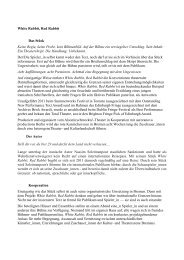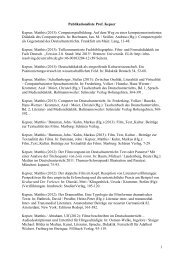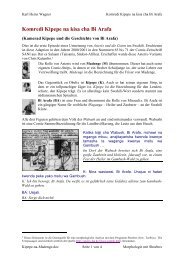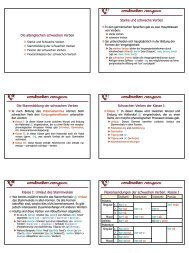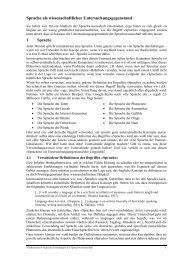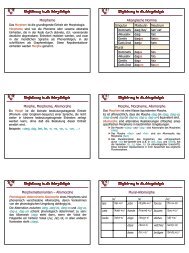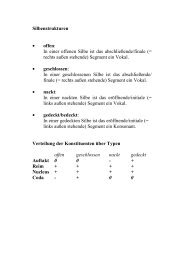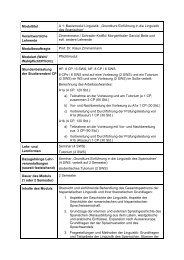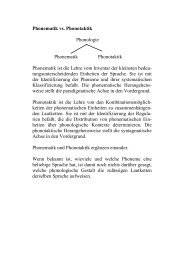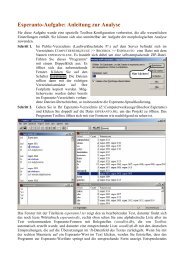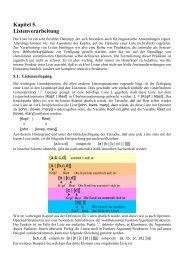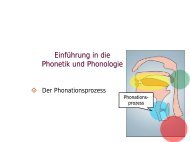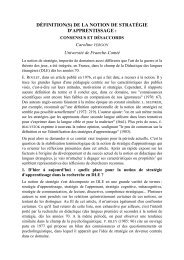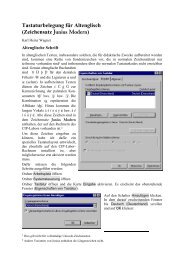Relativism and Universalism in Linguistics - Fachbereich 10 ...
Relativism and Universalism in Linguistics - Fachbereich 10 ...
Relativism and Universalism in Linguistics - Fachbereich 10 ...
Create successful ePaper yourself
Turn your PDF publications into a flip-book with our unique Google optimized e-Paper software.
152 Workshops<br />
Onyeche, J. (2004) “As Naija pipo dey tok : a Prelim<strong>in</strong>ary Analysis of the Role of Nigerian<br />
Pidg<strong>in</strong> <strong>in</strong> the Nigerian Community <strong>in</strong> Sweden”. Africa <strong>and</strong> Asia 4, 48 – 56, Göteborg :<br />
Department of African <strong>and</strong> Oriental Languages.<br />
Welcome <strong>and</strong> <strong>in</strong>troduction to Postcolonial Pragmatics<br />
Janney, Richard W.<br />
University of Munich<br />
janney@lmu.de<br />
The ma<strong>in</strong> question this panel wishes to address is: to what extent are the patterns of facesav<strong>in</strong>g<br />
claimed by Brown <strong>and</strong> Lev<strong>in</strong>son (1978) really universal? S<strong>in</strong>ce the publication of<br />
Brown <strong>and</strong> Lev<strong>in</strong>son’s work, several other works have been published that describe patterns<br />
of politeness <strong>and</strong> face-sav<strong>in</strong>g <strong>in</strong> Non-western cultures that are dist<strong>in</strong>ctly different from those<br />
<strong>in</strong> Western cultures. Although some researchers have discussed politeness <strong>in</strong> certa<strong>in</strong> African<br />
<strong>and</strong> Asian cultures, it is still not established if the further mix of languages <strong>and</strong> l<strong>in</strong>guistic<br />
identities created by colonialism play a significant role <strong>in</strong> the way speakers <strong>in</strong> multil<strong>in</strong>gual<br />
postcolonial speech communities produce <strong>and</strong> react to speech acts related to politeness <strong>and</strong><br />
face-sav<strong>in</strong>g. This issue is particularly complex, because language use <strong>and</strong> abuse play<br />
important roles <strong>in</strong> many areas of postcolonial life. Language can be a powerful mediator of<br />
underst<strong>and</strong><strong>in</strong>g, empowerment, <strong>and</strong> solidarity, or a source of repression, disempowerment, <strong>and</strong><br />
discrim<strong>in</strong>ation. Choices of what <strong>and</strong> how (<strong>and</strong> <strong>in</strong> what languages) th<strong>in</strong>gs are expressed st<strong>and</strong><br />
at the centre of postcolonial pragmatic <strong>in</strong>terest.<br />
If certa<strong>in</strong> face-sav<strong>in</strong>g strategies (hedg<strong>in</strong>g, compliment<strong>in</strong>g, understat<strong>in</strong>g, distanc<strong>in</strong>g, etc.) are<br />
relatively uniform <strong>in</strong> Western cultures, as Brown <strong>and</strong> Lev<strong>in</strong>son claim, how are these realised<br />
<strong>in</strong> postcolonial contexts? What happens to these strategies among speakers who have<br />
complex, hybrid l<strong>in</strong>guistic identities built on mixtures of foreign languages imposed dur<strong>in</strong>g<br />
colonialism, <strong>in</strong>digenous languages, <strong>and</strong> the languages of wider communication (Pidg<strong>in</strong>s <strong>and</strong><br />
Creoles)? Do speakers adopt situational faces, us<strong>in</strong>g the different languages (<strong>and</strong> with these,<br />
identities) at their disposal to project such faces? Or do they adopt stabile face-sav<strong>in</strong>g patterns<br />
specific to one language <strong>and</strong> culture <strong>in</strong> their daily communication? Answers to these<br />
questions could be found by analyz<strong>in</strong>g everyday face-to-face discourse, political <strong>and</strong><br />
<strong>in</strong>stitutional discourse, pr<strong>in</strong>t media discourse, literary discourse, <strong>and</strong> all forms of<br />
electronically mediated communication.<br />
Although the focus of this panel is primarily on face-sav<strong>in</strong>g, papers related to the myriad<br />
locutionary forms, illocutionary functions, <strong>and</strong> perlocutionary effects of language<br />
communication <strong>and</strong> communication systems <strong>in</strong> postcolonial contexts are welcome as well.<br />
Papers deal<strong>in</strong>g with natural discourse <strong>and</strong> issues of cultural displacement, migration,<br />
hybridity, diaspora, <strong>and</strong> the role of public <strong>and</strong> government media <strong>in</strong> shap<strong>in</strong>g perceptions of<br />
postcolonial history, politics, <strong>and</strong> regional, ethnic, <strong>and</strong> social identities will also be<br />
considered. With its emphasis on communication <strong>and</strong> issues of identity, agency,<br />
underst<strong>and</strong><strong>in</strong>g, <strong>and</strong> empowerment <strong>in</strong> different postcolonial contexts, this panel wishes to<br />
provide a common platform for <strong>in</strong>terdiscipl<strong>in</strong>ary cooperation between scholars of different<br />
persuasions with <strong>in</strong>terests <strong>in</strong> language, communication, <strong>and</strong> postcolonial questions.



